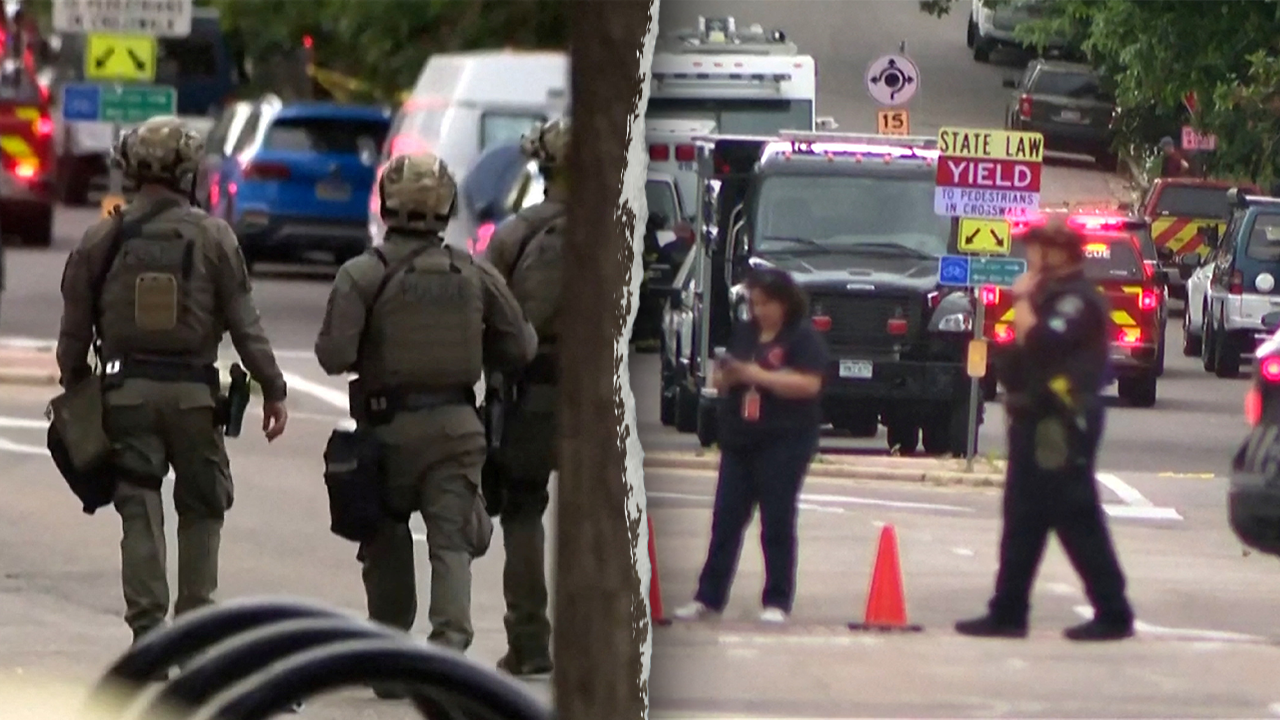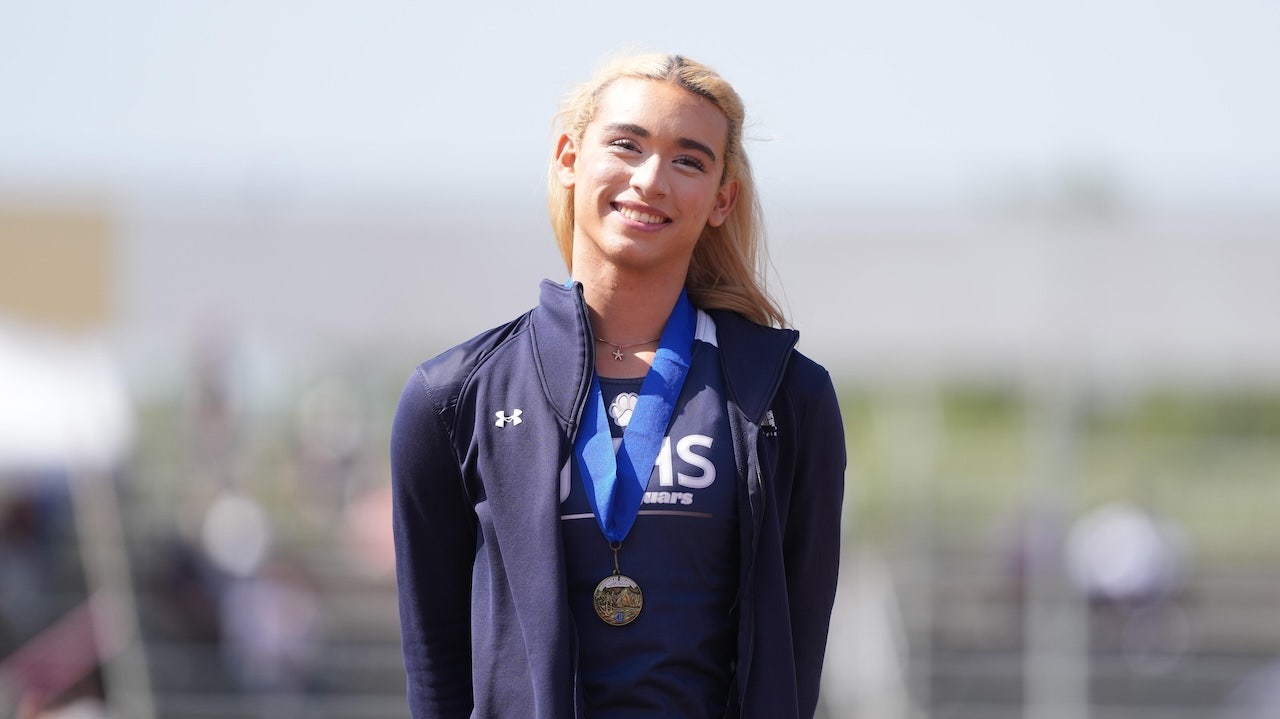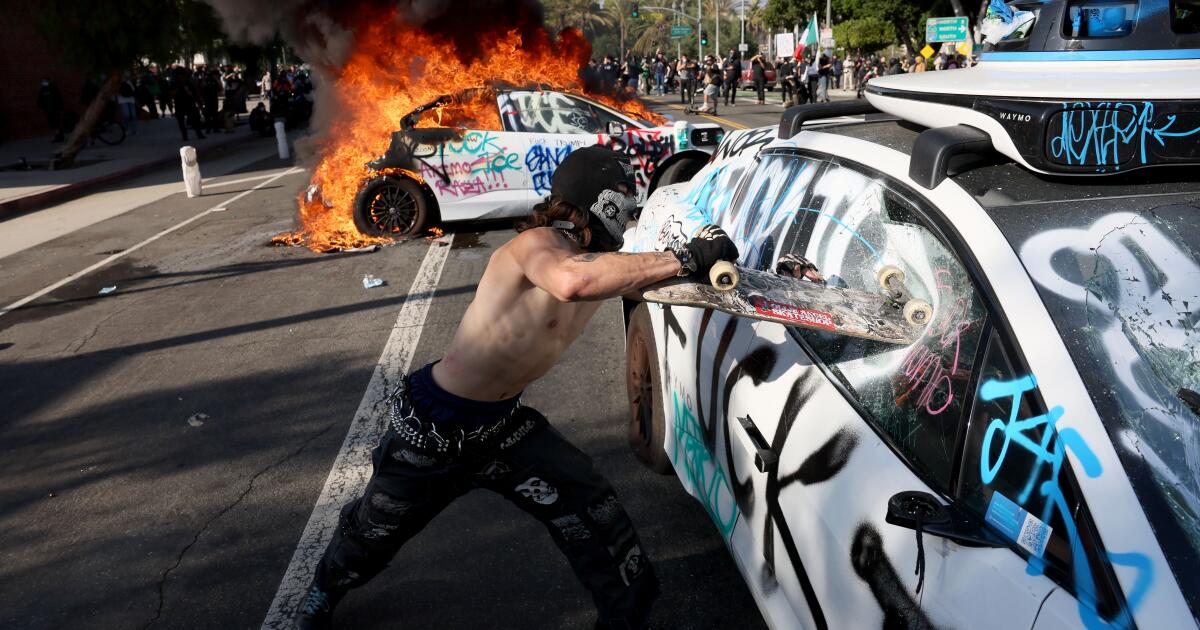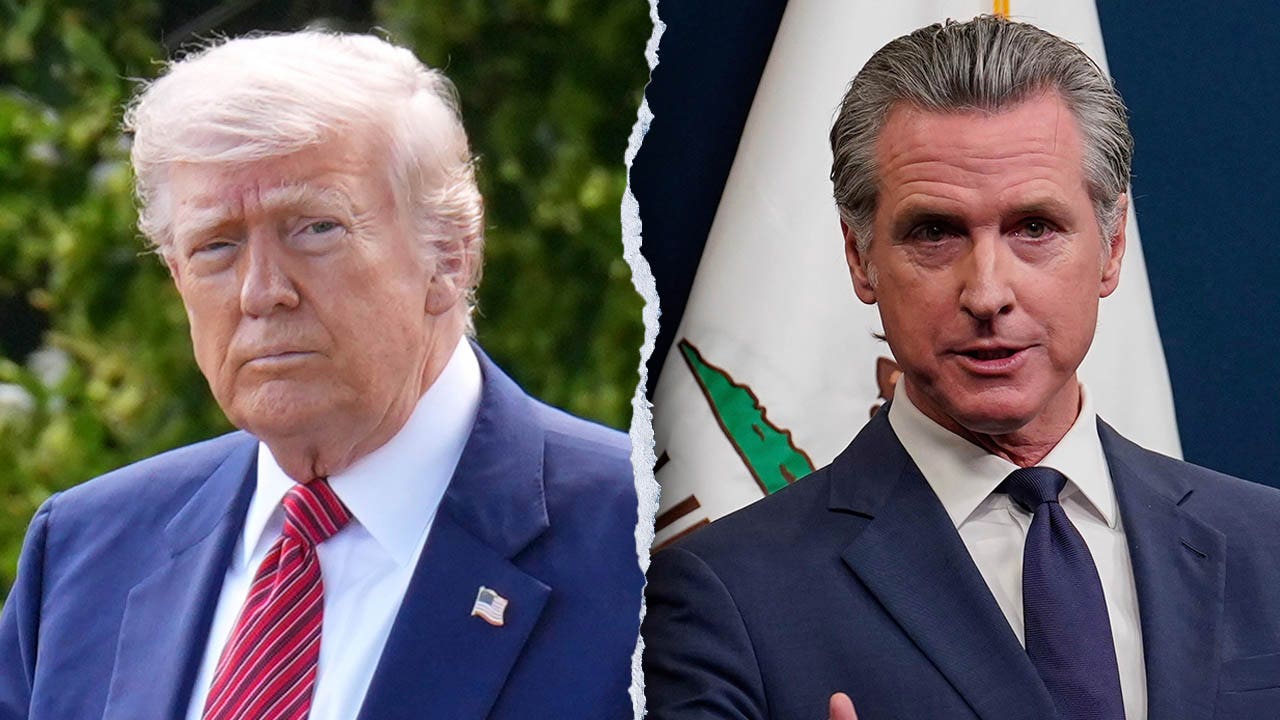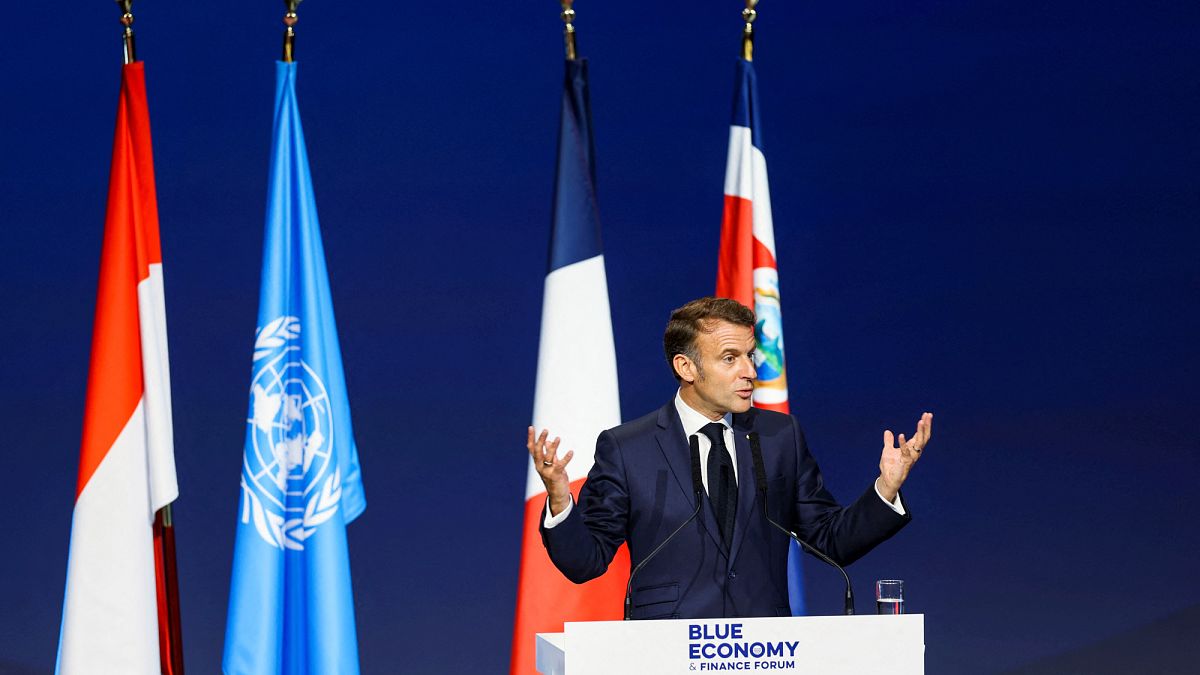Lifestyle
Kacey Musgraves says a past boyfriend helped her become more accepting : Wild Card with Rachel Martin

A note from Wild Card host Rachel Martin: I’ve been thinking a lot about authenticity lately. That word is thrown around so much right now that I’m afraid it’s losing some of its power. But regardless, we all seem to be craving it, right? Real interactions with people. Authentic connections. The rough, messy truth of things. It’s definitely one of the big reasons I started Wild Card, and it’s what I want in my own life. I want it in my relationships, but I also want it in the music, the films and the books I consume, all the things.
Every artist is after authenticity in some way, but the thing I love about Kacey Musgraves is that she just is it. From the beginning of her career, the songs she wrote were just about the life she was living and how she saw the world. She sang about falling in love with fellow country musician Ruston Kelly and getting married to him. And then later on, she sang about falling out of love with him and getting divorced. But she also sings about smoking pot and queer relationships. And she’s the kind of artist who will put a disco song on one of her albums and not give two hoots if you think she’s not country enough, thank you very much.
Musgraves is making her art her way and she’s making it for herself. That other people dig it, that’s some sort of major fringe benefit that has put her at the top of the charts and won her album of the year at the Grammys in 2019 (and it was only the fourth country album to ever get that honor). Musgraves’ latest album is Deeper Well and she’s on tour now.
Kacey Musgraves — “Deeper Well” music video.
YouTube
This Wild Card interview has been edited for length and clarity. Host Rachel Martin asks guests randomly-selected questions from a deck of cards. Tap play above to listen to the full podcast, or read an excerpt below.
Question 1: What’s something about the place you grew up that you couldn’t wait to leave behind?
Kacey Musgraves: First of all, I’m going to say that I had a wonderful childhood, but I did grow up in a very conservative part of East Texas.
Rachel Martin: Tell me the name of the town.
Musgraves: Golden. It’s really small. There is a post office, but there’s not a school. It’s not big enough for a school. So I think growing up there, it’s different than growing up in a city where there’s, like, a million different viewpoints and there’s a million different religions and a million different cultures and languages. There’s a lack of diversity where I grew up. And I just had this urge to see the world and travel – that’s when I started really understanding that everyone is the same, you know? And I wouldn’t have gotten that if I would have stayed there.

Martin: I get that. I came from a small town in Idaho. I totally felt that too. And I can’t figure out how I knew any different, you know? Because it was just my whole world and my family had been, like, from the same place for five, six generations.
Musgraves: Right.
Martin: Did you have family who lived in other places? Like, how did it come into your imagination that there was a different way to live?
Musgraves: I think it’s just a natural curiosity. And thinking that really anything is possible. And that I don’t have to do it the same way as everyone else.
Question 2: Was there a bedrock truth in your life that you came to find out wasn’t true?
Musgraves: This also gets to where I grew up and preconceived notions about certain things. For instance, the acceptance of people in the queer community was kind of nonexistent where I grew up. I could count on one hand the amount of times I encountered an openly gay person. That’s not to say that I encountered people who weren’t closeted. But, there was a majority view of, “It’s Adam and Eve, not Adam and Steve.” That kind of mentality.
So I left Texas with this kind of idea that, “Well, people choose to be that way.” And when I moved to Nashville, I started making friends in that community. And I had a boyfriend at the time who did me a huge favor. He was from a completely different upbringing than me, a liberal family in upstate New York. He had a ton of gay friends and he just sat me down one day and we had a real hard and honest conversation about it.

Musgraves performs in Nashville in March.
Jason Kempin/Getty Images for ABA
hide caption
toggle caption
Jason Kempin/Getty Images for ABA
He was like, “Listen, you do not have the right perspective on this.” He just helped me completely open up my eyes and see and I was just like, “Damn, I’m so glad that I had the opportunity to get out of where I came from, and to have my eyes and my heart open to this really wonderful community, and they’ve made me way more well rounded.”
Martin: You talk about queer relationships in your art. I mean, that’s clearly intentional. Do you feel sort of an obligation to use your platform that way?
Musgraves: Well, one of the best compliments that I’ve ever received in terms of my music and who I am in the world is that occasionally people will come up to me and say, “Hey, I grew up in a really small town like you did, and I’ve always loved country music, but I’ve never felt invited to that party.” Honestly, it really wasn’t about ever pushing buttons. It just was me observing what was happening around me and doing my job as a songwriter to put that in the form of a song.
And to me, country music is always about real people, real stories. And why wouldn’t it continue to evolve?
Question 3: Does time feel like a positive or negative force in your life right now?
Musgraves: Honestly, the passage of time is something that like, really f***s me up.
Martin: Really?

Musgraves: Yeah. There’s something so melancholy about it. Just seeing your grandparents get older, your parents get older, relationships changing. Looking in the mirror and seeing wrinkles that weren’t there before. It’s really trippy, like how it moves and bends.
I’m just thankful. I’m thankful for it. I’m thankful for the time I have. And I do feel like life keeps getting better as I get older. That’s something that everyone that’s older than you tells you, and you’re like, “Yeah, whatever.” But, I do feel that.
I’m in a period of time where this chapter is not defined by anyone else but me. And I don’t know what’s going to come next. And that’s rare for me. I feel like I’m usually jumping to the next relationship because I love companionship and it’s just been really nice to like, slow down time and enjoy exactly where I’m at. And enjoy the not-knowing of what or who might be next, you know?
Martin: That’s such a lovely answer. Because it’ll come.
Kacey Musgraves’ acceptance speech after winning Album Of The Year at the 2019 GRAMMYs.
YouTube
Musgraves: Yeah, and it’s funny, even in terms of looks, you know, we see pictures of ourselves five years ago and we’re like, “Damn, I wish I would’ve known how great or how in shape I was then. I was so down on myself.”
Rachel: Kacey, we are the youngest we will ever be right now!
Musgraves: Right now! I know. I hate it. I’m just kidding. When I kick off my shows I’m like, “Hey, everybody, we’re existing right now at the same exact time on this crazy planet in the middle of this crazy universe. It’s a miracle that we are here at the same time. And this moment right now, who you’re with tonight, what you’re going through in your life, what I’m going through in my life, is never going to be the same as it is right now. So, let’s just be as present as possible.”
It’s just a nice reminder, like, let’s put our phones down. I mean, you know, take some cute pictures, get the good angles, tag me [laughs]. But let’s be present.

Lifestyle
She delivered Hailey Bieber's baby and saved Olivia Munn's life. Her new calling? Podcast host

Stepping into Dr. Thaïs Aliabadi’s Beverly Hills space, you may forget for a second you’re in a gynecologist’s office. A massive glass chandelier dangles from the ceiling. Ceramic sculptures dot the sleek surfaces. Nearby sits a potted olive tree and a lighted antique silver Illuminazione candle. Crystal butterflies sit in two ornate cabinets. Floor-to-ceiling glass windows show a 360-degree view of the Hollywood Hills.
And then, there’s the physician herself.
Dr. Thaïs Aliabadi
(Stella Kalinina / For The Times)
Clad in a bright blue dress she’s held onto since a guest appearance on “The Doctors” 10 years ago, she acknowledges she personally opts for neutrals in real life (and her signature pink scrubs when seeing her patients), but that she’d been advised to wear jewel tones for “on camera” moments. In a town known for sculpting movie stars, Aliabadi looks like she could be on “Grey’s Anatomy” as she towers in high heels and a sparkly pink and white butterfly necklace as she poses for a Los Angeles Times photographer.
Aliabadi has delivered the babies of Rihanna, Khloe Kardashian and Hailey Bieber. She has also diagnosed Olivia Munn with breast cancer, Tiffany Haddish with endometriosis and Florence Pugh with polycystic ovary syndrome (PCOS).
All of these celebrities’ health journeys are public information because her famous patients have discussed them in detail on her weekly podcast, “SHE MD,” which she co-hosts with former fashion designer Mary Alice Haney. The show — which was launched by Dear Media, the largest women’s podcast network, in March of last year — aims to educate women about common overlooked medical conditions. It regularly features interviews with Aliabadi’s famous patients and other celebrity doctors or authors who discuss everything from preeclampsia to egg-freezing.
“My dad was like, ‘I did some research and the best person in the business is this doctor named Dr. Thaïs Aliabadi,’” Sofia Richie Grainge, daughter of Lionel Richie, explains on a recent episode of the podcast. She started seeing Aliabadi at 15.
“They are the most privileged women in this world — especially when it comes to access to medical care,” Aliabadi says of the podcast’s famous guests. “These are women who have good insurance. They can afford going to any doctor on this planet and yet their symptoms are [still] dismissed. They’re speaking from their heart because they want to help another woman.”
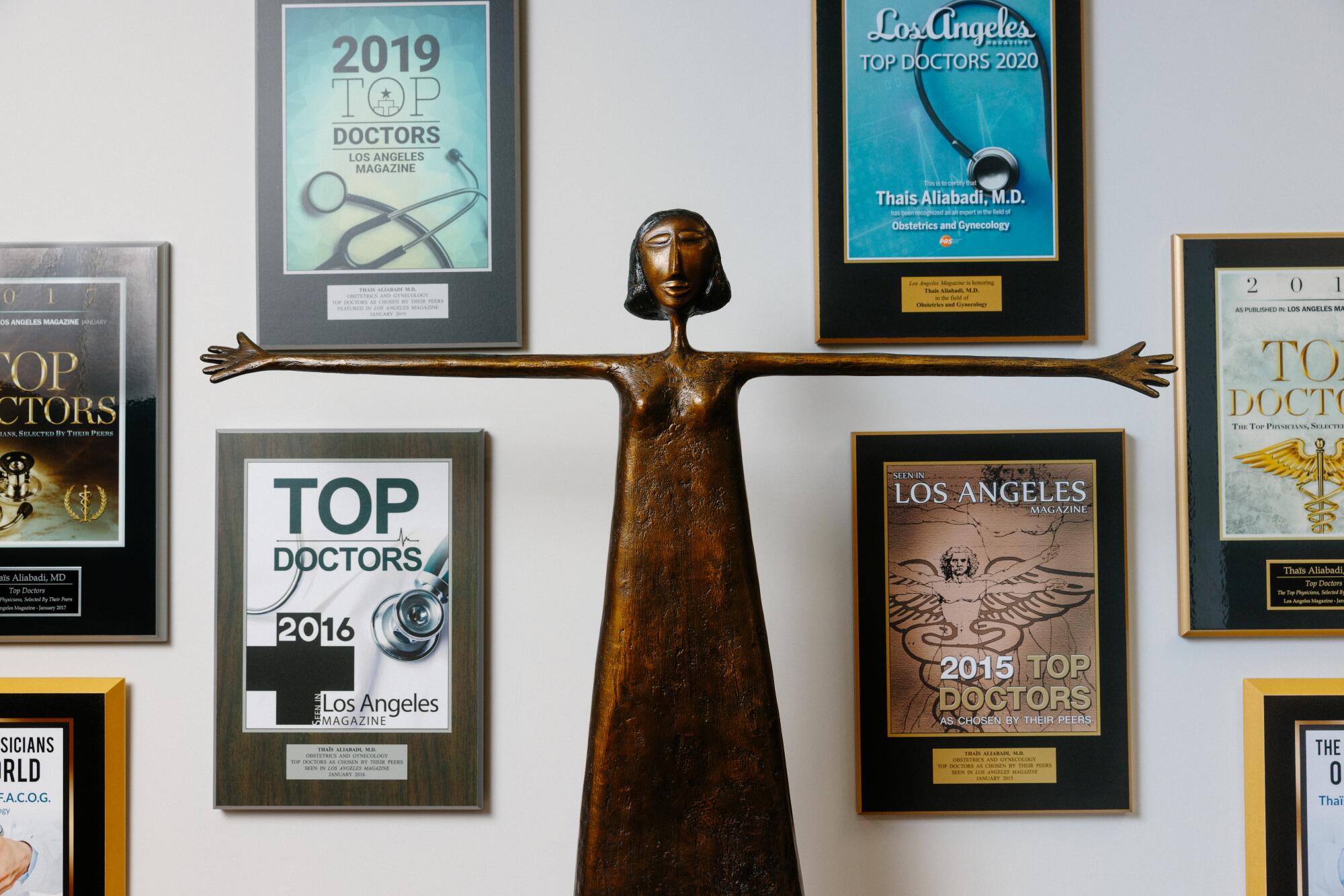
Awards hang on the wall of Dr. Thaïs Aliabadi’s Beverly Hills office.
(Stella Kalinina / For The Times)
Aliabadi’s high-profile clients and podcast have elevated her status on social media. Called Dr. A by patients and fans, she boasts 441,000 followers on Instagram, where she shares clips of her celebrity interviews. She regularly appears on network television to discuss women’s health. She has even made the occasional cameo on “The Kardashians” as Khloe Kardashian’s ob-gyn. She’s run with the role, both with the professed hopes of educating women on their health, but also with business prospects.
Haney urged Aliabadi to co-create SHE MD to combat misinformation surrounding women’s health issues. “We are providing a resource that is backed by science and medicine,” says Haney. “People are getting their medical information on TikTok. That’s dangerous.”
With women’s health entering the spotlight as an overlooked area of medicine and as fewer people have access to healthcare, becoming one’s own medical advocate has never been more important — and confusing. It’s led to the rise of wellness influencers with questionable qualifications, which is why Aliabadi says she committed to doing the podcast.
“If you want to talk about endometriosis, how many endometriosis surgeries have you done?” Aliabadi says. “How many thousands of patients have you treated?”
Aliabadi is connecting with consumers on many platforms with “SHE MD,” which is filmed like a glossy talk show from a Brentwood office. They can listen to her and Haney’s hourlong podcast episodes or catch video clips on social media.
“SHE MD,” which stands for “Strong Healthy Empowered,” features deep dives with health and medical experts — as well as celebrities such as SZA, Shailene Woodley, Tiffany Haddish and Olivia Munn — on a variety of topics including fertility, breast cancer, menopause and endometriosis. Key takeaways and action plans are available following each conversation.

Aliabadi reviews patients’ labwork. She helped save Olivia Munn’s life by suggesting she take the Tyrer-Cuzick test that revealed she had an alarming lifetime risk of breast cancer. Now Munn says it’s her mission to get more women to take the test.
(Stella Kalinina / For The Times)
Munn’s story in particular garnered national attention after Aliabadi diagnosed her with an aggressive breast cancer in April 2023. With a clear mammogram, ultrasound and pap smear, Munn’s cancer could’ve been among the estimated 20% that go undetected, according to the National Cancer Institute. But it was discovered after Aliabadi introduced her to the Tyrer-Cuzick test, which assesses one’s lifetime risk of breast cancer. Munn’s score was an alarming 37.3%. (Anything above 20% is considered high-risk.) An MRI, further ultrasounds and biopsies revealed she had Stage 1 invasive cancer, and Munn underwent a double mastectomy.
“Without Thaïs being so proactive I don’t know when or at what stage I would’ve found it,” Munn tells The Times. “She saved my life.”
Aliabadi says Munn felt a responsibility to turn her pain into purpose. “Olivia came to me and said, ‘I want to talk about this issue,’” she recalls. “She knew that sharing her story will save millions of lives.”
Munn felt compelled to speak out while still coming to terms with her diagnosis. “I was looking back on photos of playing with my then 1-year-old son, and I realized that at that time I had just had a clear mammogram and ultrasound — yet I had breast cancer and didn’t know it,” she says. “I asked myself, ‘How many other women [are] also walking around unaware they had breast cancer?’ I knew then that I had to talk about it. This little known, lifetime risk score test is free, online and saved my life. Every woman can and should know their score. Thaïs told me this test had been around for years, and it was her lifelong mission to get every woman in the world to know about it. It has since become my mission too.”
Long before becoming ob-gyn to the stars, Aliabadi recalls waking to the sounds of sirens and bombs while growing up in Tehran during the Iranian revolution in 1979. “We would all run down to the shelter that we had created underground,” she says. “Imagine a 12-year-old doing that five times a night.” Her family was granted a green card when she was 17. “It felt like the gates of heaven were opening for me,” she recalls thinking after landing in Los Altos. “We were like, ‘Why would we ever go anywhere else?’”
After medical school at Georgetown University School of Medicine and completing her residency at USC Medical Center, Aliabadi, 54, opened her private practice at Cedars-Sinai Medical Center in Los Angeles in 2002. She credits word of mouth, and her office manager of nearly 25 years, Kimmy Ferdowski, with helping her build the practice she has today. “When I first started, there was a gynecologist across the hall who told me something I’ll never forget,” Aliabadi recalls. “He said, ‘Every happy patient who leaves your office will refer four other patients to you.’”
That mantra and her detailed approach are the secret to her success, she says. “I look at my patient as a whole,” says Aliabadi, whose appointments run between 30 minutes to an hour, leading her to stop taking insurance around seven years ago. “I don’t just look at your uterus, tubes, ovaries, breasts and say, ‘You’re done.’ I talk about depression. This morning, I was scheduling an MRI and MRA of a brain to rule out [a] possible stroke in a patient of mine.” Now, her fees vary by patient, but she offers “superbills” for potential reimbursement, similar to therapists who don’t take insurance.
Women with “complicated cases” typically come to her with health concerns that have gone otherwise undiagnosed elsewhere.
Take for example, “Lopez vs Lopez” actor Mayan Lopez, daughter of comedian George Lopez, whom Aliabadi diagnosed with insulin resistant PCOS in her 20s — even though she’d been describing the same symptoms to other doctors since she was 10. Her symptoms became even more prevalent during college, when she developed excess facial hair and gained 75 pounds in three months without explanation despite eating well and exercising. By 23, her hormone levels were so low she was practically menopausal.
Lopez says she felt elated once she had a diagnosis and plan for proper treatment. “I just remember going into the car and crying from pure relief,” she says. “For the first time in a decade, I felt hopeful and unafraid of my body.”
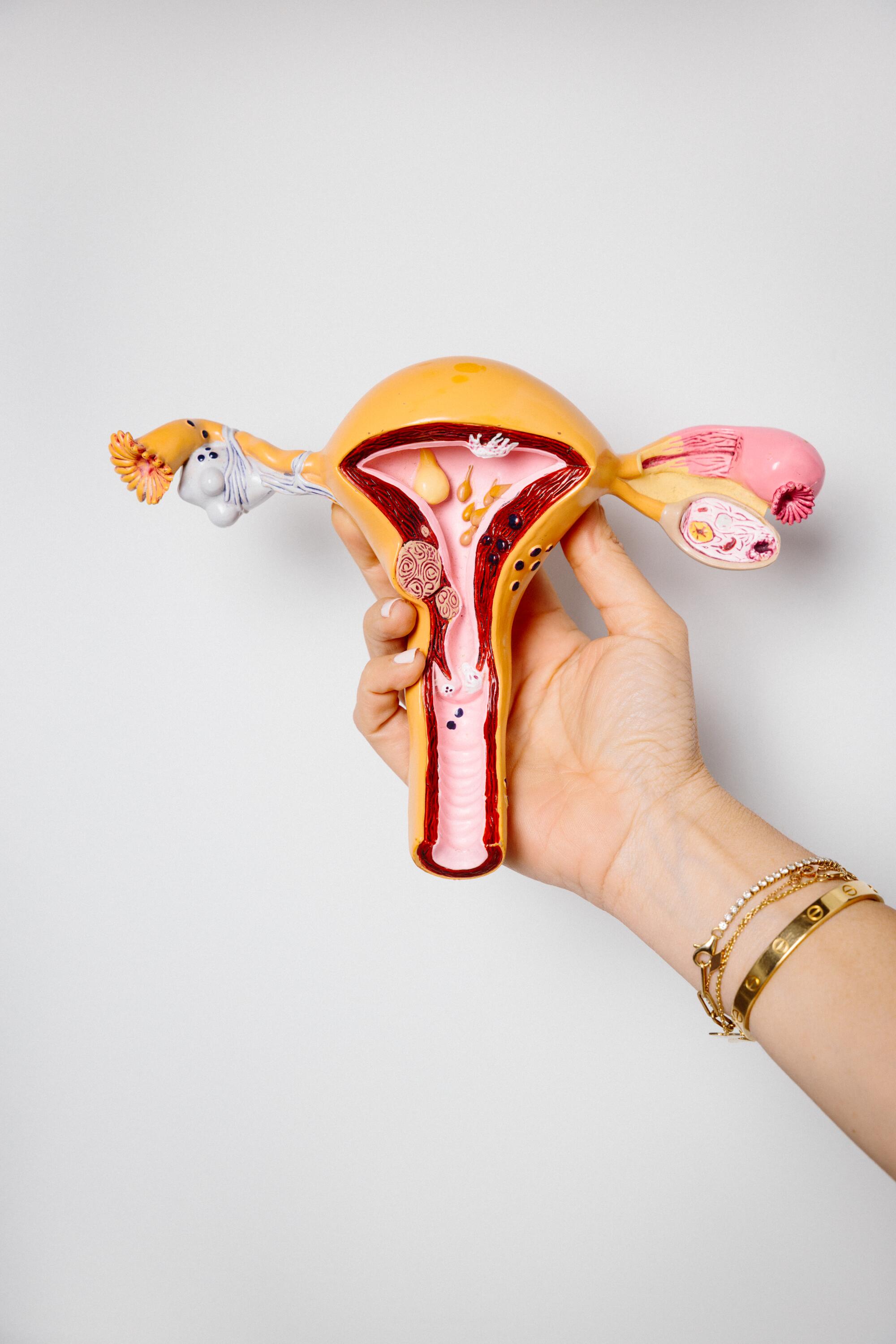
Aliabadi says she does more than the typical pap smear at her appointments, taking notice of other issues her patients may be having, like depression or hair loss.
(Stella Kalinina / For The Times)
“I see every dismissed woman in this town,” Aliabadi says. “These patients are complicated. You need to sit down and listen [to their symptoms].”
Aliabadi has other frustrations with the healthcare system.
“The issue is,” she says as she lets out an exasperated sigh. “I mean, there are so many issues.” She points out that even the most informed person still needs access to a doctor willing to listen as well as the ability to afford treatment. “If they’re going to charge you $3,800 for a breast MRI, ‘Can you afford it?’” she says. “There are limitations at so many levels.”
By not taking insurance, one could argue she too is creating another limit, but she blames insurance companies that don’t recognize quality time spent with patients. “I’m not seeing you in five minutes.”
Given the limited time patients often have with their doctors, Aliabadi hopes women will demand more from their care providers if she arms them with the right questions to ask.
Despite trying to build an online persona with the help of her celebrity circle, Aliabadi confesses she’s not very online or in touch with pop culture.
“Sometimes [Khloe Kardashian] calls me, and I think I’m just talking to her,” says Aliabadi, who delivered her second baby via a surrogate on the show in 2022. “Then six months later, my daughter’s like, ‘Mom, they called you [on the show.]’”
That’s why Haney is the media savvy yin to Aliabadi’s medical yang. “She’s a doctor first, and she’s a podcast host second,” says Haney.
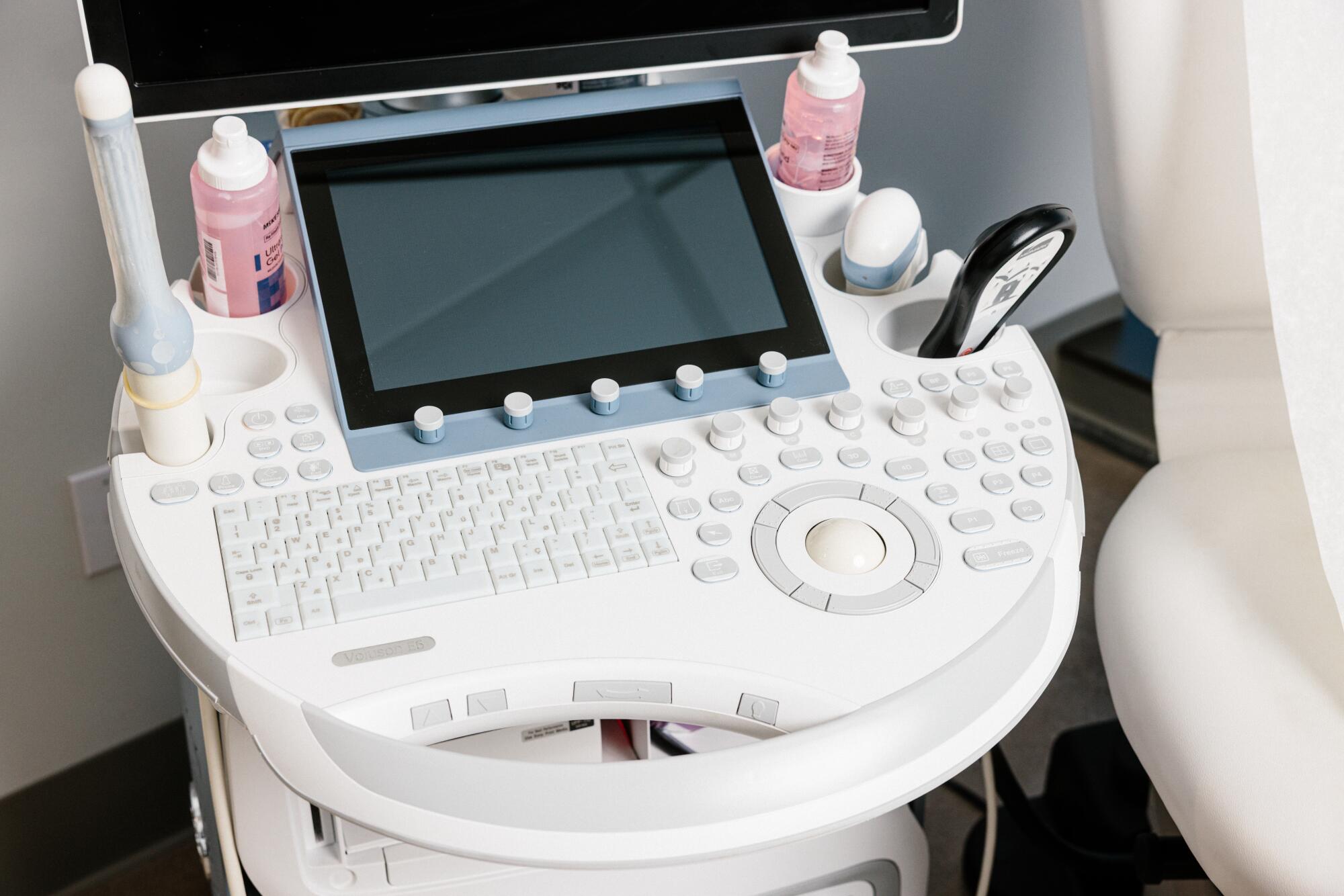
An ultrasound machine in Aliabadi’s Beverly Hills office.
(Stella Kalinina / For The Times)
Like other medical professionals and influencers in the wellness world aiming to expand their reach, Aliabadi has her own nutritional supplement, Ovii, which she advertises on her podcast. At $79.99, Ovii is aimed at women with PCOS and includes ingredients such as vitamin D, magnesium and biotin. And like other supplements advertised on podcasts, it hasn’t been tested in peer-reviewed clinical studies.
In the long term, she’s exploring a chatbot, a tool increasingly used by influencers to communicate with fans. Aliabadi believes her chatbot can help expand access to women’s health education.
“It’ll sound like me. It’ll be trained by me. Obviously, it’s just for knowledge and education. It cannot treat or prescribe,” she says.
Aliabadi welcomes technological advances to shake up the medical field.
“I look forward to robotic doctors,” she says. “The robot will not dismiss a woman who said, ‘I’ve gained 40 pounds in two years, and I’m doing exactly what my skinny sister is doing. Something’s wrong.’”
Aliabadi has four daughters, who are 20, 19, 13 and 4 (she recently adopted the youngest). Her oldest daughters attend Stanford University and she sees them following in her footsteps. She advises them to become doctors or develop technology to help women around the world.
“I think that is more powerful,” she says.
Lifestyle
Tony Awards 2025: The complete list of winners

The cast and crew of Maybe Happy Ending accept the award for Best Musical during the 78th Annual Tony Awards.
Charles Sykes/Invision/AP
hide caption
toggle caption
Charles Sykes/Invision/AP
The 78th Annual Tony Awards hosted by Wicked star Cynthia Erivo, will be held Sunday at Radio City Music Hall in New York City. The award show will be airing on CBS, and streaming on Paramount+. Below is the full list of 2025 Tony Award nominees, with winners marked in bold.
Best Musical
Buena Vista Social Club
Dead Outlaw
Death Becomes Her
Maybe Happy Ending
Operation Mincemeat: A New Musical
Best Play
English
The Hills of California
John Proctor is the Villain
Oh, Mary!
Purpose
Best Revival of a Play
Eureka Day
Romeo + Juliet
Thornton Wilder’s Our Town
Yellow Face
Best Revival of a Musical
Floyd Collins
Gypsy
Pirates! The Penzance Musical
Sunset Blvd.
Best Performance by an Actor in a Leading Role in a Play
George Clooney, Good Night, and Good Luck
Cole Escola, Oh, Mary!
Jon Michael Hill, Purpose
Daniel Dae Kim, Yellow Face
Harry Lennix, Purpose
Louis McCartney, Stranger Things: The First Shadow

Cole Escola accepts the Best Performance by an Actor in a Leading Role in a Play award for Oh, Mary!
Theo Wargo/Getty Images for Tony Awards Productions
hide caption
toggle caption
Theo Wargo/Getty Images for Tony Awards Productions
Best Performance by an Actress in a Leading Role in a Play
Laura Donnelly, The Hills of California
Mia Farrow, The Roommate
LaTanya Richardson Jackson, Purpose
Sadie Sink, John Proctor is the Villain
Sarah Snook, The Picture of Dorian Gray

Sarah Snook accepts the Best Performance by an Actress in a Leading Role in a Play award for The Picture of Dorian Gray.
Theo Wargo/Getty Images for Tony Awards Productions
hide caption
toggle caption
Theo Wargo/Getty Images for Tony Awards Productions
Best Performance by an Actor in a Leading Role in a Musical
Darren Criss, Maybe Happy Ending
Andrew Durand, Dead Outlaw
Tom Francis, Sunset Blvd.
Jonathan Groff, Just in Time
James Monroe Iglehart, A Wonderful World: The Louis Armstrong Musical
Jeremy Jordan, Floyd Collins
Best Performance by an Actress in a Leading Role in a Musical
Megan Hilty, Death Becomes Her
Audra McDonald, Gypsy
Jasmine Amy Rogers, BOOP! The Musical
Nicole Scherzinger, Sunset Blvd.
Jennifer Simard, Death Becomes Her
Best Performance by an Actor in a Featured Role in a Play
Glenn Davis, Purpose
Gabriel Ebert, John Proctor is the Villain
Francis Jue, Yellow Face
Bob Odenkirk, Glengarry Glen Ross
Conrad Ricamora, Oh, Mary!
Best Performance by an Actress in a Featured Role in a Play
Tala Ashe, English
Jessica Hecht, Eureka Day
Marjan Neshat, English
Fina Strazza, John Proctor is the Villain
Kara Young, Purpose

Kara Young accepts the Best Performance by an Actress in a Featured Role in a Play award for Purpose.
Theo Wargo/Getty Images for Tony Awards Productions
hide caption
toggle caption
Theo Wargo/Getty Images for Tony Awards Productions
Best Performance by an Actor in a Featured Role in a Musical
Brooks Ashmanskas, SMASH
Jeb Brown, Dead Outlaw
Danny Burstein, Gypsy
Jak Malone, Operation Mincemeat: A New Musical
Taylor Trensch, Floyd Collins
Best Performance by an Actress in a Featured Role in a Musical
Natalie Venetia Belcon, Buena Vista Social Club
Julia Knitel, Dead Outlaw
Gracie Lawrence, Just in Time
Justina Machado, Real Women Have Curves: The Musical
Joy Woods, Gypsy
Best Direction of a Play
Knud Adams, English
Sam Mendes, The Hills of California
Sam Pinkleton, Oh, Mary!
Danya Taymor, John Proctor is the Villain
Kip Williams, The Picture of Dorian Gray
Best Direction of a Musical
Saheem Ali, Buena Vista Social Club
Michael Arden, Maybe Happy Ending
David Cromer, Dead Outlaw
Christopher Gattelli, Death Becomes Her
Jamie Lloyd, Sunset Blvd.
Best Book of a Musical
Buena Vista Social Club, Marco Ramirez
Dead Outlaw, Itamar Moses
Death Becomes Her, Marco Pennette
Maybe Happy Ending, Will Aronson and Hue Park
Operation Mincemeat: A New Musical, David Cumming, Felix Hagan, Natasha Hodgson and Zoë Roberts
Best Original Score (Music and/or Lyrics) Written for the Theatre
Dead Outlaw, Music & Lyrics: David Yazbek and Erik Della Penna
Death Becomes Her, Music & Lyrics: Julia Mattison and Noel Carey
Maybe Happy Ending, Music: Will Aronson, Lyrics: Will Aronson and Hue Park
Operation Mincemeat: A New Musical, Music & Lyrics: David Cumming, Felix Hagan, Natasha Hodgson and Zoë Roberts
Real Women Have Curves: The Musical, Music & Lyrics: Joy Huerta and Benjamin Velez

Will Aronson and Hue Park accept the Best Score award for Maybe Happy Ending.
Theo Wargo/Getty Images for Tony Awards Pro
hide caption
toggle caption
Theo Wargo/Getty Images for Tony Awards Pro
Best Choreography
Joshua Bergasse, SMASH
Camille A. Brown, Gypsy
Christopher Gattelli, Death Becomes Her
Jerry Mitchell, BOOP! The Musical
Patricia Delgado and Justin Peck, Buena Vista Social Club
Best Orchestrations
Andrew Resnick and Michael Thurber, Just in Time
Will Aronson, Maybe Happy Ending
Bruce Coughlin, Floyd Collins
Marco Paguia, Buena Vista Social Club
David Cullen and Andrew Lloyd Webber, Sunset Blvd.
Best Scenic Design of a Musical
Rachel Hauck, Swept Away
Dane Laffrey and George Reeve, Maybe Happy Ending
Arnulfo Maldonado, Buena Vista Social Club
Derek McLane, Death Becomes Her
Derek McLane, Just in Time
Best Costume Design of a Play
Brenda Abbandandolo, Good Night, and Good Luck
Marg Horwell, The Picture of Dorian Gray
Rob Howell, The Hills of California
Holly Pierson, Oh, Mary!
Brigitte Reiffenstuel, Stranger Things: The First Shadow
Best Costume Design of a Musical
Dede Ayite, Buena Vista Social Club
Gregg Barnes, BOOP! The Musical
Clint Ramos, Maybe Happy Ending
Paul Tazewell, Death Becomes Her
Catherine Zuber, Just in Time
Best Lighting Design of a Play
Natasha Chivers, The Hills of California
Jon Clark, Stranger Things: The First Shadow
Heather Gilbert and David Bengali, Good Night, and Good Luck
Natasha Katz and Hannah Wasileski, John Proctor is the Villain
Nick Schlieper, The Picture of Dorian Gray
Best Lighting Design of a Musical
Jack Knowles, Sunset Blvd.
Tyler Micoleau, Buena Vista Social Club
Scott Zielinski and Ruey Horng Sun, Floyd Collins
Ben Stanton, Maybe Happy Ending
Justin Townsend, Death Becomes Her
Best Sound Design of a Play
Paul Arditti, Stranger Things: The First Shadow
Palmer Hefferan, John Proctor is the Villain
Daniel Kluger, Good Night, and Good Luck
Nick Powell, The Hills of California
Clemence Williams, The Picture of Dorian Gray
Best Sound Design of a Musical
Jonathan Deans, Buena Vista Social Club
Adam Fisher, Sunset Blvd.
Peter Hylenski, Just in Time
Peter Hylenski, Maybe Happy Ending
Dan Moses Schreier, Floyd Collins

Natalie Venetia Belcon and the cast of Buena Vista Social Club perform onstage during the Tony Awards.
Theo Wargo/Getty Images for Tony Awards Productions
hide caption
toggle caption
Theo Wargo/Getty Images for Tony Awards Productions
Best Scenic Design of a Play
Marsha Ginsberg, English
Rob Howell, The Hills of California
Marg Horwell and David Bergman, The Picture of Dorian Gray
Miriam Buether and 59, Stranger Things: The First Shadow
Scott Pask, Good Night, and Good Luck
Special Tony Awards will be presented to:
The musicians who make up the band of Buena Vista Social Club – Marco Paguia (Music Director, Conductor/Piano); David Oquendo (Associate Music Director, Guitar); Renesito Avich (Tres); Gustavo Schartz (Bass); Javier Días, Román Diaz, Mauricio Herrera (Percussion); Jesus Ricardo (Trumpet); Eddie Venegas (Trombone); Hery Paz (Woodwinds); Leonardo Reyna (Piano);
The Illusions & Technical Effects of Stranger Things: The First Shadow (Jamie Harrison, Chris Fisher, Gary Beestone & Edward Pierce).
As previously announced, the 2025 Tony Honors for Excellence in the Theatre will be presented to Great Performances, Michael Price, New 42, and The New York Public Library for the Performing Arts. The Isabelle Stevenson Tony Award will be presented to Celia Keenan-Bolger. Harvey Fierstein will receive the Special Tony Award for Lifetime Achievement in the Theatre.
Lifestyle
Emily Ratajkowski Celebrates 34th Birthday With 'Cake-Themed' Bash
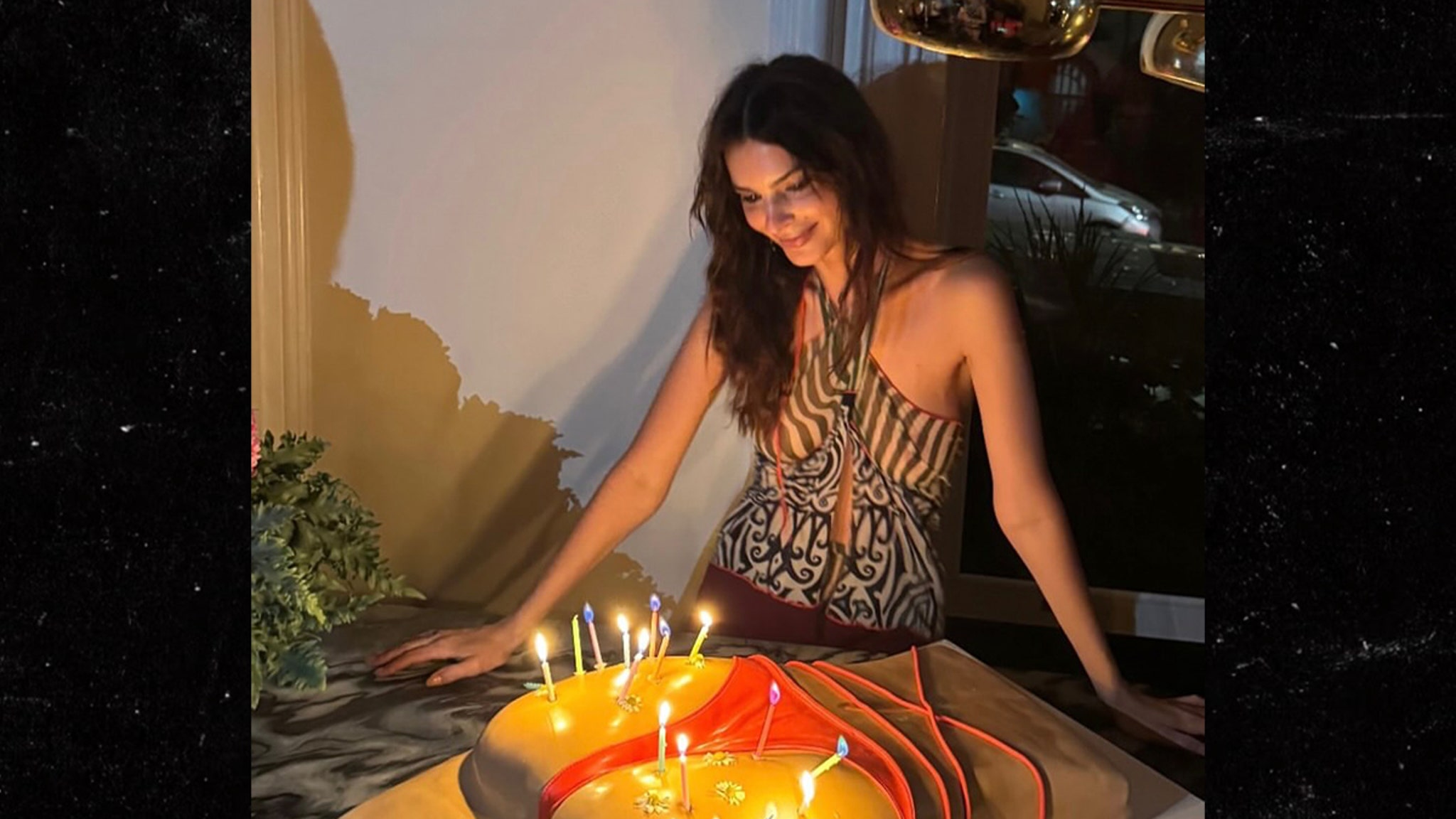
Emily Ratajkowski
My Birthday’s No Bum Note…
It’s All About the Cheek!!!
Published
Emily Ratajkowski just turned 34 and she let the cheeks do the talking — throwing a bootylicious blowout where the cake wasn’t just dessert, it was the main event.
The model documented it all over on IG — she had a ‘cake-themed’ party featuring a literal gigantic butt cake in thong bottoms — safe bet it was modeled after her own — plus nonstop twerking with her crew and enough jiggle to make J.Lo proud.
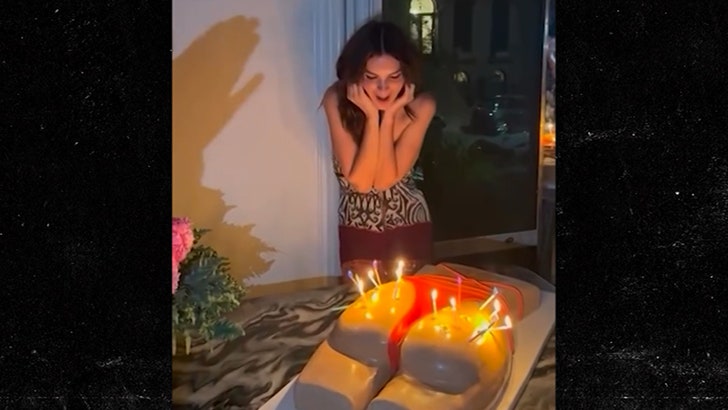
She was living her best life — blowing out candles, slicing into that peachy posterior, and chalking it all up to one thing: being a chaotic, party-starting Gemini.
Truly a rear-ly unforgettable bash!!!
-

 Politics1 week ago
Politics1 week agoMichelle Obama facing backlash over claim about women's reproductive health
-

 Technology1 week ago
Technology1 week agoOpenAI wants ChatGPT to be a ‘super assistant’ for every part of your life
-

 Movie Reviews1 week ago
Movie Reviews1 week agoThe Verdict Movie Review: When manipulation meets its match
-

 West3 days ago
West3 days agoBattle over Space Command HQ location heats up as lawmakers press new Air Force secretary
-

 Finance1 week ago
Finance1 week agoHere's what will boost your feeling of financial well-being the most, researchers say
-

 Technology1 week ago
Technology1 week agoWhy do SpaceX rockets keep exploding?
-

 World1 week ago
World1 week agoTwo killed in Russian attacks on Ukraine before possible talks in Turkiye
-

 News1 week ago
News1 week agoDepartment of Homeland Security lists sanctuary jurisdictions in Northern California
